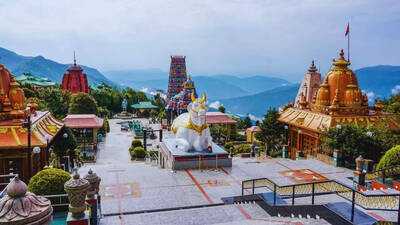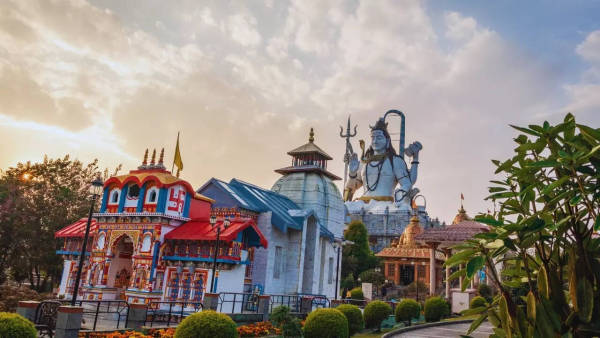Have you been to Sikkim's Char Dham yet?
ETimes | November 15, 2025 10:39 PM CST

Perched on top of Solophok Hill in Namchi, South Sikkim, the Char Dham, also known as Siddhesvara Dham, is one of the state’s most iconic spiritual and cultural landmarks. Commissioned by the Government of Sikkim and inaugurated in November 2011, this sprawling pilgrimage complex was created to boost religious tourism while offering devotees a chance to experience India’s four sacred dhams: Badrinath, Dwarka, Jagannath Puri, and Rameswaram, all in one place. Surrounded by mist-draped hills, manicured gardens, and sweeping views of the Himalayas, Sikkim's Char Dham has quickly become a must-visit destination for both pilgrims and casual travellers.
The grand Shiva statue at the heart of the complexAt the centre of the complex stands its most striking feature, an 87-ft statue of Lord Shiva seated in a meditative posture. The statue sits atop a 108-ft high temple structure styled after the traditional South Indian Dravidian architecture. The combined height makes it one of the most visually commanding Shiva statues in India, visible from several parts of Namchi.

The temple beneath the statue is dedicated to Siddhesvara Mahadev, and devotees can offer prayers inside the sanctum. The detailing on the idol and temple walls depicts various stories from Shiva Purana, making the complex both spiritually significant and educational.
The uniqueness of Sikkim’s Char Dham lies in its architectural recreation of the four major pilgrimage sites that form India’s famous Char Dham circuit. Each replica temple is designed to closely mirror the original in aura and style:
Badrinath Dham (Uttarakhand)A vibrant replica of the sacred shrine dedicated to Lord Vishnu, complete with its characteristic colourful façade and traditional Garhwali architecture.
Jagannath Dham (Odisha)Built in the style of Puri’s iconic temple, it includes detailed carvings and the classic towering shikhara.
Dwarka Dham (Gujarat)Designed after the Dwarkadhish Temple, this shrine honours Lord Krishna in his royal form.
Rameswaram Dham (Tamil Nadu)This temple mirrors the South Indian Dravidian style, complete with intricate pillars reminiscent of the Rameswaram corridors.
For devotees who may not be able to travel across the country to visit the original sites, this complex allows them to experience all four holy dhams in one destination.

Twelve Jyotirlinga replicasAnother highlight of the Char Dham complex is the presence of 12 Jyotirlinga shrines, each dedicated to a different form of Lord Shiva, from Somnath to Kedarnath to Vaidyanath. These have been constructed in exact architectural likeness to the original jyotirlinga temples across India.
For many pilgrims, visiting these shrines within one campus is a profound spiritual experience, offering a sense of completion and fulfillment that usually requires extensive travel.
The Char Dham complex is much more than a cluster of temples, it’s a peaceful, beautifully landscaped spiritual park. Some key attractions include:
Best time to visitIf you are visiting, October to December is the best time to do so. This is the best time to enjoy stunning, clear views and pleasant weather. March to May is also pretty comfortable, it is also the blooming season with comfortable temperatures. Avoid heavy monsoon months as landslides may affect travel in some areas.
The grand Shiva statue at the heart of the complexAt the centre of the complex stands its most striking feature, an 87-ft statue of Lord Shiva seated in a meditative posture. The statue sits atop a 108-ft high temple structure styled after the traditional South Indian Dravidian architecture. The combined height makes it one of the most visually commanding Shiva statues in India, visible from several parts of Namchi.

The temple beneath the statue is dedicated to Siddhesvara Mahadev, and devotees can offer prayers inside the sanctum. The detailing on the idol and temple walls depicts various stories from Shiva Purana, making the complex both spiritually significant and educational.
The uniqueness of Sikkim’s Char Dham lies in its architectural recreation of the four major pilgrimage sites that form India’s famous Char Dham circuit. Each replica temple is designed to closely mirror the original in aura and style:
Badrinath Dham (Uttarakhand)A vibrant replica of the sacred shrine dedicated to Lord Vishnu, complete with its characteristic colourful façade and traditional Garhwali architecture.
Jagannath Dham (Odisha)Built in the style of Puri’s iconic temple, it includes detailed carvings and the classic towering shikhara.
Dwarka Dham (Gujarat)Designed after the Dwarkadhish Temple, this shrine honours Lord Krishna in his royal form.
Rameswaram Dham (Tamil Nadu)This temple mirrors the South Indian Dravidian style, complete with intricate pillars reminiscent of the Rameswaram corridors.
For devotees who may not be able to travel across the country to visit the original sites, this complex allows them to experience all four holy dhams in one destination.

Twelve Jyotirlinga replicasAnother highlight of the Char Dham complex is the presence of 12 Jyotirlinga shrines, each dedicated to a different form of Lord Shiva, from Somnath to Kedarnath to Vaidyanath. These have been constructed in exact architectural likeness to the original jyotirlinga temples across India.
For many pilgrims, visiting these shrines within one campus is a profound spiritual experience, offering a sense of completion and fulfillment that usually requires extensive travel.
The Char Dham complex is much more than a cluster of temples, it’s a peaceful, beautifully landscaped spiritual park. Some key attractions include:
- The Kirateshwar statue: A majestic 16.5-ft statue of Kirateshwar (Lord Shiva in his hunter form), inspired by the legendary episode from the Mahabharata.
- Meditation centre: A quiet space designed for introspection and guided meditation sessions.
- Viewing decks: The viewing decks offer panoramic views of the rolling hills and the distant Himalayan ranges.
- Cultural centre and exhibition hall: This exhibition hall and cultural centre showcase Sikkimese culture and Hindu mythology.
- Stunning hilltop location: At about 5,000 feet above sea level, Solophok Hill is blessed with cool breezes, wide horizons, and lush greenery.
- Architectural grandeur: The scale, detail, and originality of the structures make it a landmark for architecture enthusiasts.
- Easy accessibility: Located just 5–6 km from Namchi town, the complex is easily reachable by road from Gangtok, Pelling, or Darjeeling.
- Blend of nature and spirituality: Unlike many busy pilgrimage centres, Char Dham in Sikkim is spacious, well-maintained, and serene, perfect for peaceful sightseeing.
- Cultural Importance: The complex hosts various Hindu festivals, making it a vibrant venue for cultural events and devotional gatherings.
Best time to visitIf you are visiting, October to December is the best time to do so. This is the best time to enjoy stunning, clear views and pleasant weather. March to May is also pretty comfortable, it is also the blooming season with comfortable temperatures. Avoid heavy monsoon months as landslides may affect travel in some areas.
READ NEXT
-
Farooq Abdullah Triggers Massive Row With Operation Sindoor Remark

-
What does the colour of your urine say about your health

-
9 doctor-approved habits that can help reduce the risk of cancer naturally

-
Why is this Maharashtra hill station called the 'Italy of India?'

-
Risks of high-dose vitamins: How Vitamin A, D, E, Niacin and others can harm your heart and liver
